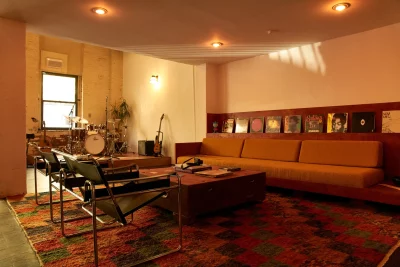To Cave Canem on Its 20th Birthday


“We’re having party after party over the next year and a half,” Kyla Marshell says of Cave Canem’s 20th anniversary year—of note one in New York on April 28 at Housing Works Books. Marshell sits in the poetry nonprofit’s sun-filled office in DUMBO, a converted industrial space that retains its high ceilings, wood floors. A giant table dominates the space, surrounded by purple chairs. Bookshelves full of poetry line one corner of the room.
Marshell, a poet and essayist, has worked for Cave Canem for two years, first as a contractor and, since last year, as their development and marking associate. The office is small, just four people. (They recently added a grants manager.) The organization’s impact, however, is enormous.
Poets Toi Derricotte and Cornelius Eady founded Cave Canem in 1996 as a retreat for African American poets. A trip to Pompeii inspired the name and the logo: there, the famous Roman mosaic (appropriately located in front of the House of the Tragic Poet) warns “Cave Canem,” Latin for “Beware of Dog,” below an image of a canine crouched as if about to pounce. In the organization’s logo, the chain holding the dog back is broken. The metaphor for Derricotte and Eady was twofold: Cave Canem would simultaneously protect poets and unleash essential but unheard voices into the poetry world.
The organization has since grown from a group of 26 poets to a nationwide community of more than 400 fellows and 900 workshop participants. You’d be hard pressed to find a major poetry award Cave Canem fellows haven’t won: the Pulitzer, the National Book Award, the Rona Jaffe Foundation Writers’ Award, the Whiting Writers’ Award, the Poetry Society of America’s Norma Farber First Book Award, the NAACP Image Award, the Laughlin Award from the Academy of American Poets, the Ruth Lilly and Lannan fellowships. Together this extraordinary group of poets have more than 250 books in print and uncounted positions in universities across the country.
“Terrance Hayes, he started off as an intern at the very first retreat,” Marshell says. “There are a lot of stories like that. Look at all these famous poets who won the Cave Canem Poetry Prize”—the organization’s annual first-book prize—“Tracy K. Smith. Natasha Trethewey. Major Jackson.” Now a Pulitzer Prize winner, a U.S. poet laureate, and a National Book Critics Circle and NAACP Image award nominee, respectively, they were then relatively unknown poets. Before they achieved their later successes, “their original affiliations were with Cave Canem,” Marshell explains.
National Book Award-winning poet Nikky Finney calls Cave Canem “the major watering hole and air pocket for black poetry.” Walter Mosley, the bestselling novelist, adds “Cave Canem is about the truth. Cave Canem is about the pain we experience getting to the truth. Cave Canem is the denial of the fear that has taught us to cower and retreat from the day we’re born all the way to the grave.”
“Cave Canem has served to shoehorn black poets into the mainstream,” agrees poet and program director Nicole Sealey, “and has forever changed the literary landscape for the better.”
Cave Canem has been headquartered in New York since 2004 and in DUMBO since 2010. They still run the annual writing retreat, bringing 54 emerging African American poets to the campus of the University of Pittsburgh at Greensburg tuition-free, as well as coordinate a host of other projects and events. Cave Canem has published four anthologies, administers three prizes (the Cave Canem Northwestern University Press Poetry Prize and the Toi Derricotte and Cornelius Eady Chapbook Prize in addition to the Cave Canem Prize), curates two conversation series (“Legacy Conversations” and “Poets on Craft”), collaborates with eleven writing residencies, hosts a lecture series, and regularly offers low-cost or free writing workshops.
Marshell first encountered Cave Canem at a poetry reading in Atlanta in 2006. Two of the readers were Cave Canem fellows. She’s also a fellow: she’s attended the retreat three times since 2010. “I went from someone who was skulking around readings to being an employee,” she observes. “It’s a life-affirming community. It’s not fake. Cave Canem has been one of the grounding forces in my life.”
Her time at the Cave Canem retreats “feels like summer camp,” she says. “You are with someone for a week and you are friends forever.” The people she met there have remained incredibly important to her: she credits some for helping her stick with writing. She marvels, too, at the broad range of poets that Cave Canem both attracts and serves. Marshell recalls a free Cave Canem workshop she took in New York taught by National Book Award-winning poet and children’s book author Marilyn Nelson. Her classmates? Robin Coste Lewis (who won her own National Book Award this past fall) and Sapphire (whose novel, Push, was adapted into the 2009 movie Precious).
Programs director Sealey was also in that workshop, and later became a fellow. “Cave Canem has made me a better poet. Period.” As a staffer, she’s come to know the organization even better.
“I feel like the luckiest person in the world,” Sealey says of the work she and Cave Canem accomplish. “My job is to introduce audiences to black poets! For me, nothing is more thrilling than that!”
You might also like 




















